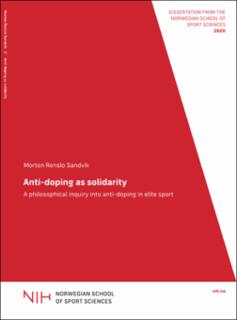| dc.contributor.author | Sandvik, Morten Renslo | |
| dc.date.accessioned | 2020-06-15T09:39:13Z | |
| dc.date.available | 2020-06-15T09:39:13Z | |
| dc.date.issued | 2020 | |
| dc.identifier.isbn | 978-82-502-0579-6 | |
| dc.identifier.uri | https://hdl.handle.net/11250/2658015 | |
| dc.description | Avhandling (doktorgrad) - Norges idrettshøgskole, 2020 | en_US |
| dc.description.abstract | Doping in elite sport is commonly understood as a moral problem. In line with this view, antidoping work is set out to protect ‘clean’ athletes and ‘the spirit of sport’ from individual athletes’ and accomplices’ lack of moral rectitude. Arguably, such ‘moralized’ and dogmatic descriptions of doping and anti-doping have warranted the development of a sophisticated control regime of biological testing and surveillance: a regime which raises numerous ethical concerns. Moreover, these descriptions have influenced a public anti-doping discourse of scandalization, mistrust and stigmatization.
The main aim of this dissertation is to develop and examine the implications of a philosophical understanding of anti-doping that challenges the dogmatic descriptions and addresses the ethical issues of current anti-doping policy and discourse. Towards this aim, the philosophical methodology of redescription is employed. This approach draws on the neopragmatism of Richard Rorty. The main impetus of Rortyan redescription is the deepening and widening of solidarity. Thus, the dissertation endeavors to develop and examine the implications of a philosophy of anti-doping as solidarity.
Four individual papers contribute towards the main aim. Paper 1 places anti-doping within a wider, historically qualified and fallibilistic endorsement of liberal values. The paper develops and examines the implications of ‘ironism’ as a philosophical basis for anti-doping commitment. It suggests that ironism contributes to more compassionate forms of commitment: more tolerant of intentionally doping athletes as persons and more aware of sport organizations’ responsibilities to all athletes.
Paper 2 develops a philosophical basis for sport organizations’ anti-doping policy and rhetoric. Redescribing ‘fair play’ as athletes’ expression of loyalty to larger groups, the paper inserts a picture of sport organizations such as the International Olympic Committee, as coordinating bodies of larger groups that appeal, through policy and rhetoric, to athletes’ larger loyalty. Anti-doping policy and rhetoric, in this picture, are developed and critically scrutinized according to their potential for fostering a sense of common interest, interdependence, and reciprocal trust across larger sporting communities.
Paper 3 examines whether, and if so how, the purposes of redescription can be served by doping-related stories, playing out in elite sport, narrated through the media and enacted by celebrity-athletes. The paper discusses two stories about athletes sanctioned for doping, interpreted as redescriptive narratives challenging dogmatic descriptions prevailing in respective sporting communities. The story of Justin Gatlin is seen to communicate to the international athletics community the idea that after serving a suspension, it makes sense for an athlete to be included as ‘one of “us”’. Similarly, the paper suggests that the story of Therese Johaug conveys to the Norwegian sporting community that some of these athletes remain ‘one of “us”’ throughout the judicial process.
Paper 4 addresses the ‘confession dilemma’ faced by former elite athletes pondering upon the question of whether to publicly confess to doping. The paper sheds light on the dissertation’s main aim by rendering visible ethical problems with the dogmatic, moralized descriptions and introducing the idea of redescription as a means to foster and cultivate alternative understandings of doping-related dilemmas.
Overall, the dissertation aspires to show that, conditional upon further development and refinement, there is promise to the philosophical understanding of anti-doping as solidarity. As a main contribution, the dissertation proposes the idea that for anti-doping policy and discourse to progress towards solidarity, what is needed in the current situation are ‘sociological’ redescriptions that draw attention to doping as a social phenomenon, playing out in social networks, fostered and made possible by the social structures of elite sport. Such redescriptions can alter the course of sport communities’ conversations away from prevailing moralized descriptions of doping and anti-doping, towards a wider discourse of cultural and political change in the organization of elite sport. | en_US |
| dc.language.iso | eng | en_US |
| dc.relation.haspart | Paper I: Sandvik, M. R. (2019). Anti-doping ironism. Sport in Society. doi:10.1080/17430437.2019.1703686 | en_US |
| dc.relation.haspart | Paper II: Sandvik, M. R. Fair Play as a larger loyalty: the case of anti-doping. In review, Sport, Ethics and Philosophy. | en_US |
| dc.relation.haspart | Paper III: Sandvik, M. R. (2019). Sport, stories, and morality: a Rortyan approach to doping ethics. Journal of the Philosophy of Sport, 46(3), 383-400. doi:10.1080/00948705.2019.1622127 | en_US |
| dc.relation.haspart | Paper IV: Sandvik, M. R. (2018). The confession dilemma: doping, lying, and narrative identity. Sport, Ethics and Philosophy, 13(2), 213-226. doi:10.1080/17511321.2018.1465113 | en_US |
| dc.title | Anti-doping as solidarity: A philosophical inquiry into anti-doping in elite sport | en_US |
| dc.type | Doctoral thesis | en_US |
| dc.description.localcode | Institutt for idrett og samfunnsvitenskap / Department of Sport and Social Sciences | en_US |
